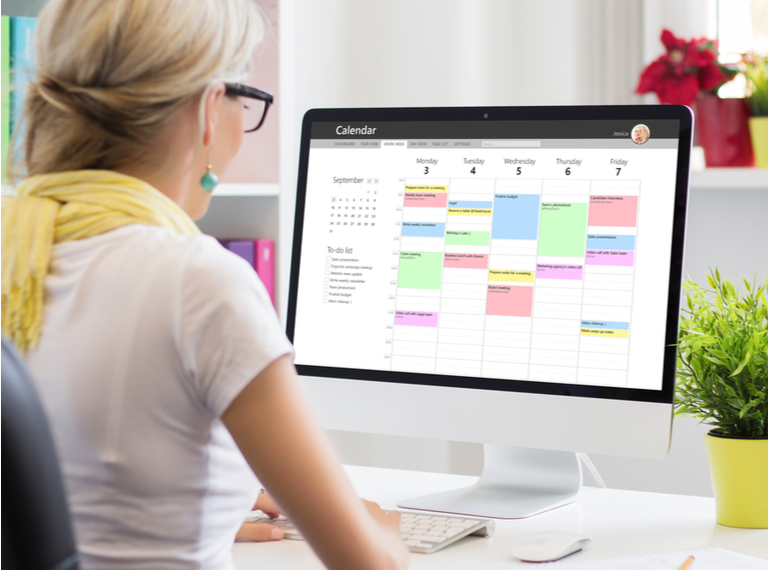
FeaturedArticleEmployer
Improve your hiring strategy with AI interview tools
Have you integrated AI into your hiring approach? AI recruitment instruments offer benefits such as accelerating the hiring process, enhancing interview queries, and minimizing prejudice. In this article, we delve into how you can utilize AI to boost your recruitment strategy.

ArticleCandidate
Interview tips & questions
Going in to the room, you should already have an idea of the kind of question you're going to get asked – for competency interviews for example, these could include sharing your experiences of working on multiple projects at once, dealing with difficult situations, or working as part of a team. Have good examples prepared, using the STAR technique (Situation, Task, Action, Result).
Generate interview questions in minutes with our interview question generator.
Interview Tip 1: Prepare for common questions
Preparation can help you to feel relaxed on the day. By having some answers ready to common interview questions, you won't be caught by surprise on the day. Make sure you prepare for the following:
Tell me about yourself
Why do you want this job?
What are your strengths and weaknesses?
Why do you want to leave your current role?
Where do you see yourself in five years' time?
That's just a flavour of the questions you'll have to answer. If you want to find out more, we've compiled a range of tips on how to answer common interview questions.
Interview Tip 2: The initial hello
You want to come across as calm, positive and friendly, so make sure you smile and speak confidently, and why not say something like "Thanks for taking the time to see me".
Interview Tip 3: The little things
Before you start, really make sure you're comfortable. Take off any coats or scarves, put your bag down, and get anything out that you might need (for example, your notebook). Then take a deep breath, you're ready to begin.
Interview Tip 4: Answer the question
It may sound silly, but you'd be surprised how many people don't actually answer what's asked. They often hear a key word and go deviating off-topic, completely forgetting what they were talking about by the time they've finished. While showing eloquence and confidence, it may drop you points on attention to detail, relevance, and listening skills. It's important to take your time, and if necessary, repeat part of the question back to your interviewer to confirm you've understood it. No-one minds if you take a couple of seconds to think, it's more beneficial for everyone to give a well-thought through answer, rather than rushing something because you want to answer quickly.
Interview Tip 5: Know when to stop
Another slip-up people make is carrying on talking after they've given their answer, as they feel they should fill the silence. Savvy interviewers sometimes leave a pause just to see how the interviewee will react under the pressure. Be confident in what you've said, and know when you've finished.
Interview Tip 6: Asking questions
Asking questions of your interviewer is expected now and it can be quite daunting. Research the company well and look at resources as to the best interview questions you can ask and make them relevant for the job you are interviewing for. Make sure you have them prepared and they are valuable to both you and the interviewer to get a gauge of your interest in the company and the role.
Interview Tip 7: At the end
Thank your interviewer(s), by name if possible, shaking their hand and looking into their eyes, as this helps make a good final impression. Be confident, you've probably done really well!

ArticleEmployer
Key considerations when writing a person specification
The first step is to advertise the role with clear and accurate information about the position available. Something that works alongside a job description is the ‘person specification'.
The person specification, or personal specification, is an important part of the recruiter’s toolbox. It allows you to communicate the traits you find desirable in an ideal candidate, such as education, previous work experience, and any extra traits needed to succeed in the role.
What is a person specification?
A person specification is a detailed description of the ideal professional, or candidate as we refer to in the recruitment sector, for a specific job role. It outlines the qualifications, skills, experience, and personal attributes required to perform the job effectively. Typically developed alongside a job description, the person specification serves as a benchmark against which applicants can be assessed, helping those hiring identify the most suitable individuals for a position. It ensures that recruitment processes are clear, consistent, and based on merit, allowing hiring decisions to be made fairly and objectively.The content of a person specification is often divided into essential and desirable criteria. Essential criteria refer to the minimum requirements a person must meet to be considered for the role, this could be holding a specific qualification or possessing a certain level of experience. Desirable criteria, on the other hand, is where you would highlight qualities or experience that would enhance an application but aren't necessary. This structure helps to filter candidates efficiently, ensuring that only those with the appropriate capabilities are shortlisted.In addition to technical and academic requirements, a person specification may include soft skills such as communication, teamwork, and adaptability. Personal qualities like motivation, reliability, and a proactive attitude can also be featured, especially if they align with the values or culture of the organisation that is hiring. By making these expectations explicit, employers not only attract the right type of applicants but also give those looking for work a clearer understanding of whether the role suits their profile and needs.
“Many companies rely solely on a job spec, focusing on the job and not the person. With talent more sought-after than ever, the more people-focused businesses are doing just that - focusing on the people.”
Chris Adcock, former Managing Director, Reed Technology
The five purposes of a person specification:
It makes the interviewing process more refined and streamlined
Jobseekers are able to assess themselves before applying and understand how they will fit in with the role and your business. This allows them to match themselves according to suitability and not just skills
It clarifies the two types of personal qualifications important to the employer: essential and desirable. This enables the employer to be explicit in what they want and how the candidate matches this criteria
It helps to communicate equal opportunities policies within the recruitment culture of a business. The law is very clear about discrimination. A person specification ensures you are assessing a candidate on their abilities related to the role
It means you test all of your candidates against the same list of priorities set out in advance. This helps remove bias, prejudice and personal interest, all of which can be problematic for recruiting successfully
What to include in a person specification
The person specification examples shown below are the types of information you should look for in a candidate. It’s important to know what is and isn’t appropriate for the vacancy you’re looking to fill.
For example, some roles have a legal requirement for the candidate to have a set level of training and qualifications. It can be a sensitive document if approached incorrectly, so it’s better to be safe than sorry.
Attainments - e.g. qualifications, experience, positions held
Soft skills - e.g. relationship building, public speaking, time management
Job-specific capabilities - e.g. use of different software or programmes, or team management
Personality traits - e.g. proactive, patient, motivated, attention to detail
Physical attributes - e.g. height, eyesight (note - these must be a justified requisite to complete the tasks within a role, not a preference)
For specialist advice on your industry, get in contact with one of our consultants here.
“While the employee and the employer have similar goals, ethics and job satisfaction, the employee will continue to work hard and give loyalty.”
Claire Harvey, Managing Director, Reed
Top tips when writing a person specification
Be realistic: It’s incredibly rare any candidate will tick all boxes. Ensure you know your must-haves from your nice-to-haves.
Identify existing skills gaps: The most successful teams are made up of individuals who bring something different to the department. Consider where your weak spots are and seek those out in the desired skills section.
Consider how you might assess the criteria: Can the candidate be tested or demonstrate the desired attributes in an interview situation when asked? If you can’t think of an example, it may be unfair to expect them to.
Check your tone of voice: It’s a good idea to have one or two people read over the document to check all points are conveyed in an appropriate manner and cannot cause offence.
How does a person specification ease the onboarding process?
Once a candidate has been chosen, the person specification makes integration and training much more organised because you will already be aware of what the candidate is able to do.
For example, if your specification required someone with excellent computer skills as being essential to the role, then you would only need to give a brief induction to the computer systems of your business.
It can also assist with creation of learning and development plans where they perhaps didn’t have certain desirable skills - yet.Recruitment agencies are experts in creating person specifications. Get in touch with one of our specialists for more advice on finding the best person to help reach your business goals.

ArticleEmployer
How to create a great recruitment strategy
Getting your recruitment strategy right is key to hitting your business goals. Here are some expert tips to help you set up your company for success – and the shortcuts to keep you ahead of your competition.
What is a recruitment strategy?
A recruitment strategy is a clear plan that explains what roles you’ll recruit for, when, why and how. It should be tied to your overall company objectives.
Your strategy must be possible to implement and easy to communicate. While you can tweak your tactics, the strategy must always be clear.
The core aspects of a great recruitment strategy
Growth Plans
In order to scale up your workforce, you’ll need to hire – which takes time and resources.
Create a measure to help you identify which areas of your business will benefit most from increased headcount.
This could focus on return on investment or opportunities lost.
Shortcut: Unsure how many new employees you’ll need? A recruitment agency will give you access to temporary staff and contractors to help you expand quickly and risk free.
Employer Brand
Make sure your employer brand and message are attractive to your target audience, particularly over social media. A well-known brand is a big selling point to talented job hunters.
Be open and transparent about the company’s working culture to ensure you attract candidates that will match your business.
Shortcut: If your brand isn’t well known, a recruitment agency can contact candidates directly and spend time promoting your employer messages.
Skills Audit
Use your company objectives to identify developing areas of the business, then decide on the skills you will need to succeed.
Your recruitment strategy should include ways to find and bring new skills into the company.
Employers often focus on advanced digital and technical skills, but you should also consider bringing in candidates with different experiences.
Shortcut: When interviewing for a role you’ve never done yourself, your recruitment consultant can offer interview tips and support to build your confidence.
"You can tweak your tactics, but your end goals must be clear."
Flexibility
If your company needs to adapt quickly to an unpredictable market then hiring permanent staff may not be the right option.
Your strategy should include a plan for temporary staff and contractors to cover projects that are likely to change at short notice.
Shortcut: Unless you already have an advanced payroll function, it makes sense to ask your recruitment agency to manage payroll for your temporary workforce. They look after tax, holiday pay and even pension contributions – saving you a lot of hassle.
When to review your recruitment strategy
You should always be thinking about how you differentiate your company from your competitors, and how you can be a more attractive prospect for potential candidates.
Pay close attention to all aspects of the recruitment process, and make tactical tweaks throughout the year when necessary – while holding firm to your recruitment strategy.
You should review your overall recruitment strategy annually to make sure it ties in with your wider business objectives. It’s important that everyone in the company understands your goals – so be clear and concise about what success looks like and how you will get there.

ArticleCandidate
Should I ask about salary at my interview?
Nothing divides interview opinion quite as much as salary…
But aside from being a great way to ensure a role is right for you, finding out how much is on offer could actually help save everyone’s time in the long run – especially if it turns out it’s not in line with your expectations.
To make sure you know exactly when (and how) to ask about salary at your interview, here are a few of our top tips:
Use the interview as a guide
First thing’s first: there are no set rules on talking about salary within an interview.
It’s all about gauging the situation, and approaching the subject with caution.
To make sure you don’t bring it up at a time when it won’t be well-received, use aspects like the interviewer’s approach, and the intensity of the questions you’re being asked, to figure out whether money is a good topic of conversation.
For example, if there is a second interview as part of the hiring process, bringing up salary might be a better fit at this stage. But if proceedings have been particularly informal, or if it’s clear there aren’t any other interviews to attend, discussing money is perfectly acceptable.
Similarly, using your questions at the end of an interview to bring up salary isn’t uncommon, and is the most effective way to introduce the subject politely – providing it’s not the only thing you ask about…
Pick the right moment
It probably goes without saying that asking how much money you could get is off limits within the first few minutes (see also: seconds) of your interview.
Not only could it indicate you’re more interested in the money than you are in the actual job, it could also imply that you don’t have much to offer in terms of skills and experience.
So, before you start to think about how much you’re making, make sure you cover all the other interview bases first. Whether it’s selling your skills, demonstrating your experience, or just concentrating on each individual question that comes up, make sure you get the basics sorted before thinking about figures.
After all, nobody likes a gold digger (thanks Kanye).
Get your expectations sorted
Before you bring up the M word, it’s important that you have salary expectations in mind – ones that represent the company and role accurately.
To make sure you go into the interview armed with as much knowledge as possible, it’s absolutely vital to research potential salary brackets beforehand, with the role and organisation in mind. Salary checkers are a great place to start, but you could also try checking similar positions in your area, which should give you a good idea.
Once you’re in the know about what they’re likely to offer, you’ll be able to come up with realistic salary expectations.
Not only does this ensure you’re both on the same page in the interview, it also safely avoids any awkward silences…
Be prepared for them to make the first move
Sometimes, an employer might come out and ask for your expectations before you bring it up yourself.
Although being asked obviously allows you the opportunity to discuss money more freely, it’s always best to maintain a sense of diplomacy with your answer.
Slightly overstating the amount you’re looking for, drawing attention to your interest in the position itself, or explaining that you need to know more before answering, are all good strategies here. Especially as they’ll help you from falling into the ‘I’m flexible’ trap, which could mean you end up receiving a lower offer than you’re looking for.
However, it’s also the perfect opportunity to politely ask the employer about the range they have in mind.
N.B. lying about your current earnings is never a good idea.
Concentrate on showing your own value
Finally, succeeding in an interview often comes down to knowing your worth.
So before anything money related comes up, you should’ve taken the time to explain your suitability and passion for the role you’re interviewing for. That way, salary will be representative of your skills and experience, and the employer will be able to accurately assess if the amount they have in mind matches up.
If you’re not sure their offer is enough for you, present your reasoning assertively, and don’t be afraid to negotiate – as long as you have the grounds to back it.
Remember: confidence is key.
If you are looking for a new role, contact your local Reed office now.

ArticleEmployer
Top 10 competency-based interview questions to find the best candidate
Competency-based interview questions help you identify whether a candidate has the right skills for the role. They take the focus away from qualifications and industry experience, and are useful when you’re looking for skills like teamwork, communication, decision making and leadership.
What is a competency-based interview?
A competency-based interview can also be known as a structured, behavioural or situational interview. They will often feature some form of activity or task which will test a candidate’s ability to do what their CV and cover letter has said they can do, alongside situational-style questions aimed to find out how they have used specific skills to solve problems.
Generate interview questions in minutes with our interview question generator.
Asking competency-based questions helps you to tease out how a candidate will apply the skills and knowledge they’ve gained in their career in your organisation.
What answers should you be looking for from competency-based interview questions?
This list of competency questions encourages interviewees to use real-life examples in their answers. You get to understand how a candidate made a decision, and see the outcome of their actions.
Our top 10 competency-based interview questions will help you recruit the skills your team needs.
1. What are your greatest strengths?
This is a classic interview question, and with good reason.
It’s a chance for your candidate to prove they have the right skills for the role. Keep the job description in mind to see whether the interviewee understands how their skills relate to the role.
Remember you’re looking for transferable skills, not proof that they’ve done the role before.
2. What will your skills and ideas bring to this company?
This competency-based question is an opportunity to see which of your candidates stand out from the crowd.
A good interviewee will show an understanding of your company goals within their answer. A great candidate will offer practical examples of how their skills can help you achieve that vision.
3. What have you achieved elsewhere?
Confidence is key in this competency-based question. It gives your candidate an opportunity to talk about previous successes and experiences that relate to your vacancy.Make sure the achievements you take away from their answers are work-related and relevant to what you’re looking for.
4. How have you improved in the last year?
Candidates can tie themselves up in knots trying to disguise their weaknesses. This competency-based interview question is a chance to show a willingness to learn from their mistakes.
It’s also an opportunity to test the interviewee’s level of self-awareness and desire to develop.
“Competency-based interview questions ask for real-life examples to show a candidate’s skills.”
5. Tell me about a time you supported a member of your team who was struggling
This competency-based question will test your candidate’s ability to show compassion towards their colleagues without losing sight of their own objectives.
Those further along in their career should be able to reference training or mentoring that not only helped their co-worker but also improved team performance.
6. Give an example of a time you’ve had to improvise to achieve your goal
In other words: “Can you think on your feet?” It is increasingly important to be able to react to unexpected situations.
The candidate’s answer should highlight their ability to keep their cool and perform in a scenario they haven’t prepared for.
7. What was the last big decision you had to make?
The answer to this question should be a window into your candidate’s decision-making process and whether their reasoning is appropriate for your role.
This is a competency-based question designed to highlight how an interviewee makes decisions. Do they use logical reasoning? Gut intuition? However, they manage big decisions, does their approach match what you’re looking for?
8. Tell me about a time you dealt with a difficult person
All candidates should be able to reference an experience of working with a challenging colleague. Look for them to approach this question with honesty and a clear example of working through the experience.
Rather than passing blame, there should be a recognition of the part they have played in the situation, and how they might tackle it differently next time.
“It’s essential to get a sense of how candidates would fit and thrive within your company culture.”
9. What was the last thing you taught?
You’ve asked the interviewee about their skills, but can they show a capability for teaching others about these skills?
This question isn’t restricted to managerial or senior roles and should be asked whenever you’re looking for a candidate who will add value to your team.
10. Why are you a good fit for this company?
The key to this competency-based question is whether the candidate can explain how their transferable skills would fit your role. This tests both an awareness of their own abilities and an understanding of what you are looking for in a new employee.
The candidate should be able to confidently explain why they want to work for your company and convince you that they would fit your team culture.
If you’re interested in learning more about interviews, please contact your local recruitment specialist.
What answers should you be looking for from competency-based interview questions?
Jobseekers should recount real-life experiences when answering competency interview questions. They should identify the competencies you have highlighted in your question and provide specific, ideally measurable, examples of occasions they’ve used these skills.
How an interviewee structures an answer to competency questions can provide you with an excellent insight into how they approach their work. Answers to competency-based interview questions should use the STAR method, with candidate explanations comprising of the following:
Situation – A brief background to the scenario where they used the skills in question.
Task – What were they asked to do which required them to use these skills?
Action – How did they go about resolving the task/situation?
Result – What impact did their solution to the situation have?
You’re looking for jobseekers to structure their answers to competency interview questions in a manner mirroring this. Not only does this demonstrate that they have prepared for the interview, but also that they have clarity of thought when put under pressure.
The danger with competency-based interview questions is that candidates can prepare for them by using the job description to identify scenarios or skills you’re likely to ask them about. This can lead to them offering pre-prepared answers which provide less insight into how they think on their feet.
What is the importance of asking competency-based interview questions when hiring?
Asking competency questions allows you to immediately see how an interviewee would respond in work-related scenarios, removing some of the guesswork of whether the role is right for them.
You will also quickly ascertain how they use the skills and experience listed in their CV and cover letter.

ArticleCandidate, Employer
A four-day work week: the pros and cons
With this sudden shift to working from home and an increase in hybrid working, we have seen more and more conversations around work-life balance and businesses questioning their ‘typical working week’.
The five-day work week has become a cultural norm but after several years of change, is it time to rethink this approach and, if we do, would businesses continue to succeed? Or would productivity take a hit?
We asked our LinkedIn followers: “Would you consider changing your company’s working hours to a four-day working week?”. With 919 votes, 50% said yes, but with the same hours, 33% said yes but with reduced hours, 12% said no, and 6% said they would consider it, but not at this time.
With 83% of those surveyed in favour of a four-day week, there are many considerations companies must make when deciding if this is a course of action they would be willing to take.
What is the case for a four-day work week?
A four-day work week can be defined in two ways; the first is when an employee compresses their full-time hours (typically 35 hours) over a four-day period. And the second is reducing an employee’s hours (typically to 28 hours) over four days, so they are then able to have a three-day weekend.
Many argue that, while the five-day work week used to be effective in the 19th century, it no longer suits the needs of the modern-day professional.
With the evolution of technology, some day-to-day tasks are significantly more time-efficient, and with an uplift in office-based roles, we are seeing an argument that longer work hours do not necessarily mean staff are more productive.
Notably, over the last couple of years, many countries across the globe including Japan, New Zealand, Spain - and most recently Iceland - have trialled the four-day work week to research the effect it has on its employees.
Microsoft trialled four-day weeks in its Japanese offices and found the shortened work week led to more efficient meetings, happier workers and boosted productivity by a staggering 40%. Similarly, Iceland undertook a trial which monitored employees working reduced hours over a variety of public sector workplaces and found it to be an overall success, with 86% of the country's workforce now on a shorter work week for the same pay.
In an article for the British Broadcasting Corporation (BBC), Will Stronge, Director of Research at four-day week consultancy Autonomy, said: “It shows that the public sector is ripe for being a pioneer of shorter working weeks - and lessons can be learned for other governments.”
In the UK, many businesses have also trialled the four-day work week, and some have even made the permanent switch. Gloucestershire-based PR agency Radioactive Public Relations trialled a four-day week for six months and found the business was even more profitable and employees’ sickness days were halved.
What are the advantages of a four-day working week?
Large and small-sized companies trialling the concept have created an evidence-base of the benefits a four-day working week could bring to your organisation.
An increase in productivity levels
Research has shown that working fewer hours boosts productivity levels. With employees spending less time at work, they can feel happier and more fulfilled, leading to them focusing on their job when in the workplace.
A large New Zealand business, Perpetual Guardian, trialled a four-day work week and found not only a 20% rise in productivity, but work-life balance scores increased from 54% to 78%.
Environmental and cost-saving benefits
Shortening your working week means that employees do not need to commute as much, reducing their carbon footprint.
As we have seen throughout the pandemic, those businesses with employees working on the same four days can save on overheads and in some cases even be eligible for tax relief.
Happier employees and fewer absences
According to mental health charity Mind, one in six people report experiencing a common mental health problem in any given week in England, UK, and one in five agreed that they have called in sick to avoid work.
Four-day work weeks leave employees more time to focus on personal development or spend time with loved ones. This will not only increase employees’ happiness, but can contribute to fewer burnouts, leaving them to be more focused and happier in their role.
Better recruitment and retention
The increase of hybrid working and remote working during the pandemic has led to employees wanting greater flexibility from their employers.
The CIPD reported that the majority of people think flexible working is positive for their quality of life, and 30% of people think it positively affects their mental health. So, offering potential new and existing employees a flexible working pattern is a fantastic way of attracting and retaining talented professionals.
What are the disadvantages of a four-day working week?
Whilst there are benefits to a four-day work week, there are disadvantages too:
"A four-day work week wouldn’t work practically because of the need to cover more shifts during a time where we are already facing staff shortages."
Not all industries can participate
Unfortunately, the four-day working week model does not suit every sector. Some businesses or professions require a 24/7 presence which would make a shortened work week unpractical and, in some cases, delay work - creating longer lead times.
A nurse who wanted to remain anonymous expressed her reservations about a four-day week in the healthcare sector, saying: “As an A&E nurse a four-day working week wouldn’t work practically for us. Currently, we work long 12+ hour shifts in order to have four days off, which I prefer as it provides more of a work-life balance. However, while I know a four-day working week would be better for some of my colleagues due to childcare, the shorter, more regular shifts we would have to do on a four-day week wouldn’t work. It would mean the need to cover more shifts during a time where we are already facing staff shortages.”
Unutilised labour
A four-day week is not for everyone; some employees prefer the structure of a five-day working week or would prefer to put in more hours than a four-day working week offers.
Likewise, some professions have tasks which simply take more time than others, which would lead to paying more in overtime or drafting in further staff to make up the shortfall (as happened in healthcare for the Icelandic study), which can ultimately become expensive.
Final thoughts: should your business adopt the four-day work week?
Although the shortened work week has taken off in many European countries and been successful for many UK businesses, it is an extreme approach for a company to take and requires a shift in mindset from the employer and employees for it to work effectively, so it may not be for everyone.
While a more flexible approach on working hours is now expected from employees, a less disruptive, more gradual process would be adopting a hybrid or flexible working policy instead.
Likewise, as mentioned above, the four-day model may not work for all sectors. What studies and data have proven is that organisations who are putting more focus on maintaining staff wellbeing, engagement, morale, and productivity are reaping the benefits.
